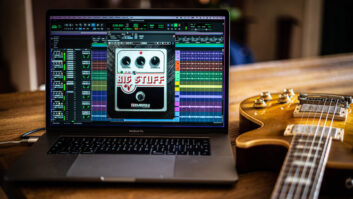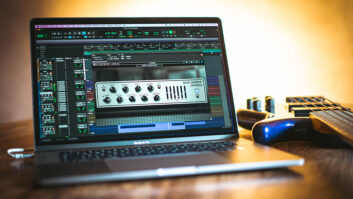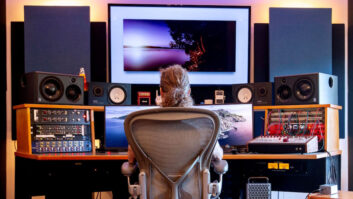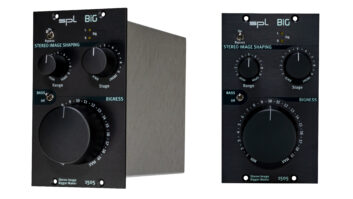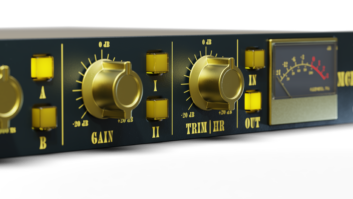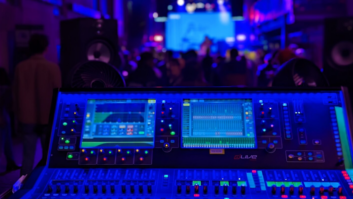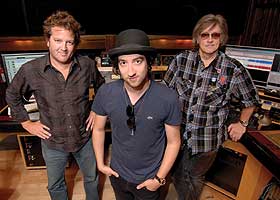
At Bernie Grundman Mastering (Hollywood), from left: Hollywood Records director of A&R Matt Harris, Plain White T’s frontman Tom Higgenson and mastering engineer Brian “Big Bass” Gardner
Photo: David Goggin
You’ve seen a lot of changes in your area of the industry. I want to ask you some questions about what your business is like today.
Before we start, I want you to know that I won’t be divulging any of my trade secrets.
That’s common among mastering engineers because many, like you, work with proprietary equipment. So we won’t go there. On a different topic, do you like the name “Big Bass”? Does it pigeonhole you?
Oh sure, I don’t mind it at all. I used to worry about that, but I’m so used to it by now that I miss it when I don’t see it.
Now that most engineers agree that converters and digital audio in general have improved, have you changed your way of working?
Aside from always upgrading and improving everything, basically it’s the same process. Most of my gear is still hand-done. I have the same main Tannoy speakers. What’s changed for me is we have new problems to deal with that have to do with levels. If anything comes out of this interview, I hope it could be mentioned that we’re getting so many projects that are just slammed and that makes things difficult.
I want to make a plea to all the high-end engineers, low-end engineers, everybody: Try not to get pushed into a corner to make it hot. I can understand why the artist or the producer says, “Why isn’t this mix as hot as this other CD?” Well, the answer is, “It hasn’t been mastered yet.” But they still push it anyway.
If they’re going to do that, supply me with a mix that’s pulled back as well, without all the processing, and let me try to maximize it. If I can’t, then I can use their pushed version. When you get a crunched project or a crunched song, anything you add just accentuates whatever is crunched in the mix. Distortion gets worse. We’re going in the wrong direction in this business and we need to start getting it back to good, punchy hi-fi sounds.
Is this issue pervasive across all genres or are some more at fault than others?
Pop and hip-hop are probably more the culprits, but I’m seeing this in all genres. I know I’ve been typecast as the one who makes it crunchy and loud, and that’s fine, but it needs to be done properly.
So your point is that you’re not necessarily opposed to creating a crunched or loud master; it’s that if the mix is already pushed, it limits your ability to create something clean and musical.
No, I don’t really object to things being loud. I just object to it crapping out: crunching, distorting. I do wish we could go back and make it a law that you can’t pass a certain level, but that’s not going to happen. Just give it to me without it being slammed because I make it punchier and cleaner and louder, for that matter, without getting into this world of distortion.
Recently, we’ve heard from a lot of mastering engineers that more is expected of them during that final step because smaller budgets don’t allow for as much time to be spent on the front end, in tracking and mixing. Do you agree that this is an issue that has changed your job?
Right, yes. And they’re also asking for a deal. Even the big boys are asking for deals. It’s discouraging, but I guess that’s just the sign of the times. Take hip-hop for instance: It seems not only to be increasing that we’re having to clean up mixes, but we’re also the ones being asked to create “clean” versions because they don’t have the money to do it in the studio. We’re having to do those edits, clean up cursing, make radio edits, that kind of stuff. That’s good for us, I guess. I shouldn’t really complain because they’re paying our rate. Actually, it ends up costing them more because it’s a higher rate in here to do it, but a lot more of that is being put on us.
What are some of the big projects you’re working on lately?
We did the Eminem album [Recovery], which is really encouraging to see become successful, to see that people will still buy. The Katy Perry album [Teenage Dream] has also done well.
Are you encouraged by what you hear in music today?
Yes, we’re hearing real music again. Real instruments and real voices, and I’m hoping that the studios survive. Those of you out there who have studios, hang on, please! Because when real instruments are required, then studios are required.
Do you ever meet audio students who want to go into mastering? Do you have any advice for someone like that?
If they have that passion, there’s always room for them. Those are words I’ve always remembered Bruce Swedien saying a long time ago: There’s always room for somebody who really has the passion and the heart to do it. If they’re in it to make a quick buck, it probably won’t happen, but if they really have the desire, there’s room.

